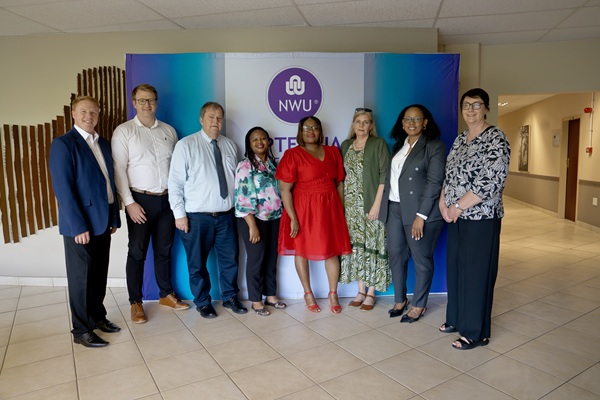The Optentia Research Unit at the North-West University (NWU) has officially launched two innovative hybrid short courses designed to build mentoring capacity and strengthen professional development among university support staff. These short courses, which were developed and presented in collaboration with People and Culture at the NWU, follows the implementation of two short courses for academics, namely Being a Successful Academic Mentor and Being a Successful Academic Mentee.
This initiative forms part of the NWU’s ongoing commitment to fostering a culture of growth, collaboration, and lifelong learning across the institution.
The Short Course in Mentoring for University Support Services develops capable mentors who value mentorship, feel confident supporting others, and demonstrate practical mentoring skills. Complementing this, the Short Course for Building Your Path to Professional Development enables mentees to identify their values, enhance their sense of agency, and build confidence in their career journeys.
Both courses adopt a learner-centred and self-directed approach, integrating interactive digital platforms such as Rise, Glide, and the Learning Management System of the NWU. Participants engage in reflective and practical learning supported by expert guidance and collaboration - fostering a sustainable culture of mentorship within the NWU community.
Event facilitator GP van Rheede van Oudtshoorn opened the launch with a warm welcome, setting a collaborative tone for an afternoon dedicated to learning and empowerment.
In her keynote address, Prof. Linda du Plessis, senior deputy vice-chancellor for teaching and learning, emphasised that the NWU’s success depends on the growth and development of its staff.
“Today we reach an important milestone as we launch initiatives that support and empower our professional and support staff,” she said.
Andiswa Msi, director for academic solutions, highlighted the importance of collaboration and adaptability within university support roles.
“When we speak of change, we need to be collaborative - there is no change we can achieve in isolation,” Andiswa said. “I am so excited about this course because when we look at our administrative roles, we need to change the narrative. We are moving from merely following processes to shaping the change.”
Helen Lekalakala, director for talent management and organisational development, commended the strong partnership between People and Culture and the Optentia Research Unit, describing it as a powerful example of learning in action.
“We celebrate the official launch of these courses. We continuously strive to cultivate a culture of learning that enables NWU staff to take our institution to greater heights,” said Helen.
“We are proud of the strong partnership between People and Culture and Optentia - it demonstrates the real impact of learning and development when grounded in collaboration and a shared vision. We commend the Optentia team for their leadership and dedication in conceptualising and implementing this important initiative.”
Prof. Ian Rothmann, director of Optentia, provided background on the development of the mentoring initiative, which began at the NWU last year.
“It doesn’t help to train only the mentor - the mentee must also be prepared,” he explained. “Both voices matter, and both need guidance. We want to empower participants to choose their own mentors, because mentoring is about mutual growth. We rise by lifting others.”
Expanding on this vision, Dr Neil Barnard, senior lecturer in the School of Industrial Psychology and Human Resource Management, spoke about the dual nature of mentoring relationships. “Each of us is both a ship and a lighthouse - navigating our own uncertain paths while shining a light that can guide others,” he said.
“Successful mentoring begins with a well-prepared mentor, but many mentoring relationships fail because mentors lack the training to guide effectively. They also fail when mentees are unprepared. That’s why, alongside our short course for mentors, we developed one for mentees - to prepare them for meaningful, empowering, and sustainable relationships.”
In her closing remarks, Prof. Mirna Nel, deputy dean for research and innovation in the Faculty of Humanities, reflected on the significance of the initiative for the university community.
“This is a proud moment for us,” Prof Nel said. “We have now developed short courses for the backbone of the university - our support staff. This is a university-wide programme, and I want to thank Prof. Rothmann and his team for investing in this initiative and for breaking down silos across the institution.”
The event concluded with a mentorship Q&A session led by van GP, offering participants the opportunity to reflect on how mentoring can drive transformation, empowerment, and professional excellence across the NWU. You can watch the launch on the NWU YouTube channel.

The Optentia Research Unit launched its groundbreaking short courses for NWU support staff."
